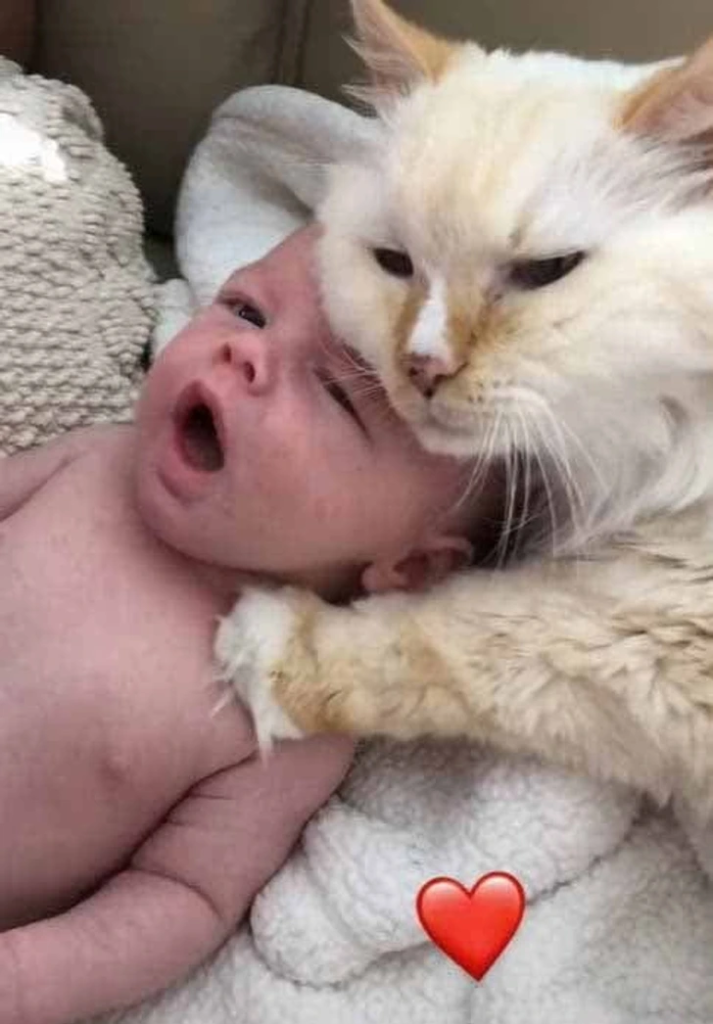In the world of pet companionship, dogs often steal the spotlight for their perceived loyalty and affection towards humans, especially babies. Cats, on the other hand, have long been labeled as solitary and indifferent. But a heartening video shared on TikTok challenges this stereotype, showcasing the remarkable bond between a protective feline named Teddy and his human baby brother, William.
A bond that started from day one.

From the moment William entered the household, Teddy, the family cat, embraced him with open paws, assuming the role of a caring and watchful «big brother.» Contrary to expectations, Teddy didn’t display an ounce of jealousy but instead showered the newborn with affection and protection, much to the delight and surprise of his owners.
Capturing these precious moments on camera, William’s parents shared their growing friendship on TikTok, where it quickly gained attention from viewers worldwide. In the videos, Teddy is seen gently interacting with William, ensuring his safety and even playfully engaging with him in his baby seat. It’s evident that Teddy sees William as his own, forming an inseparable bond that transcends species.
One video went viral.

William and Teddy’s TikTok videos are a massive hit, with one in particular reaching almost 12 million views. Witnessing the cat’s tender and affectionate behavior towards the baby brings joy to all who watch their interactions. Whether it’s sleeping next to him, keeping watch over his dreams, or delicately holding him with his paws, the cat’s unwavering commitment to the baby is evident. Refusing to leave his side, the cat seems to intuitively understand the fragility and vulnerability of the little one, embodying a protective presence that touches the hearts of all who witness their bond.
Happy comments flooded in.

The touching videos shared by William’s parents evoke a range of emotions from viewers, with many expressing admiration for Teddy’s unwavering devotion to his baby brother. Comments flooding the videos reflect the universal appeal of their bond, with some jokingly suggesting that William may have become Teddy’s surrogate. «Could anything be more precious?» one user mentioned. Indeed, Teddy’s nurturing instincts and affectionate behavior have earned him the title of a first-rate babysitter in the eyes of his adoring fans.
While others worried about the cat and baby close together.

Some people expressed concerns about allowing pets near newborns. In one of the videos, we can see comments saying «Please be careful.» Allowing cats near babies is a matter of personal choice and depends on various factors, including the temperament of the cat, the health and safety concerns of the baby, and the supervision provided by the parents or caregivers.
While many cats can coexist peacefully with newborns and even develop strong bonds with them, it’s essential to exercise caution and take appropriate precautions to ensure the safety of both the baby and the cat. However, Teddy and William’s interactions challenge preconceived notions about cats’ personalities and showcase the depth of empathy and compassion these creatures are capable of displaying.

As Teddy continues to watch over William, offering comfort and companionship in his own feline way, their story serves as a heartening reminder of the transformative power of love, transcending boundaries of species and age. In a world often divided by differences, the pure and unconditional bond between a cat and a baby provides hope and warmth, reminding us of the inherent goodness that exists within us all.
Preview photo credit williamandteddy / TikTok, williamandteddy / TikTok
Why people cover mirrors at night

Observing Night Rituals: Closing Mirrors Change of pace: When the topic of covering mirrors at night came up one evening, I was genuinely interested despite my first skepticism.Transition of Superstitious and Cultural Roots: In many civilizations, mirrors are more than just reflective surfaces.Mirrors are associated with more than simply beauty in many cultures; they are thought to reflect souls, which is why covering one’s eyes as you sleep is thought to shield the soul.

This custom, which is particularly prevalent during grief, shows respect for the departed while keeping the grieving process’ internal dynamics front and center.Transitioning from Feng Shui to Energy Balancing: This ceremony is influenced not just by cultural beliefs but also by the concepts of Feng Shui.Mirrors are said to have substantial energy-doubling properties in Feng Shui teachings.Sleeping soundly at night is facilitated by keeping the bedroom peaceful and harmonious, which is achieved through covering them.

Realistic Aspects Transition: The practice is motivated by practical factors as well as spiritual and energy-related ones.Improving the quality of sleep and creating a more tranquil sleeping environment throughout the night can be achieved by minimizing light reflections and getting rid of unexpected reflections.Typical Procedure?Transition: Contrary to popular belief, concealing mirrors at night is more prevalent than not.

This technique is a popular nightly routine for many people because it speaks to the basic human desire for safety and calm sleep, regardless of cultural borders.Individual Story and Request to Try Transition: My study led me to make the decision to add this exercise to my evening routine.Although it seemed strange at first, covering mirrors became to be a soothing routine that gave one a feeling of protection and tranquility at night.Trying this routine may help you in unexpected ways as well, whether you do it for spiritual reasons or to enhance the quality of your sleep.



Leave a Reply